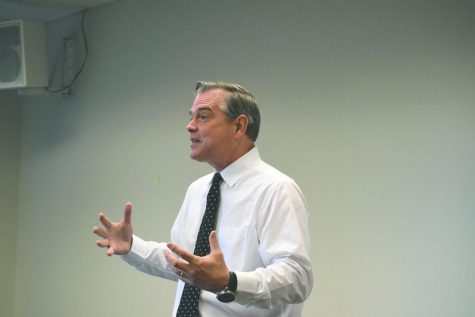Communication Studies’ 2018 Bigler Journalism Conference
Area high school students visit to learn from local journalism professionals
Kenneth P. Vogel was the keynote speaker at the event. He is pictured above delivering his speech, which was held in the McHale Athletic Center.
On April 13, the 2018 Tom Bigler Journalism Conference was held on Wilkes campus. This year’s theme was ‘What IS the news that’s fit to print… or post… or broadcast?’
The conference, which is run by the Communication Studies Department, celebrates journalism activities in high schools across the area. Over 250 students attended.
The conference consisted of the Tom Bigler Journalism Competition, which invited high school students to submit writing, photography, design, layout and production pieces for review and awards.
The conference also featured a number of speakers and workshops, including the keynote speaker, Kenneth P. Vogel.
Kenneth P. Vogel is a reporter for the New York Times Washington Bureau, as well as an author. Vogel previously worked as the chief investigative reporter for Politico. Vogel also has previous experience working for several local newspapers, including Wilkes-Barre’s The Times Leader, covering state and local politics from the newspaper’s Harrisburg bureau.
Vogel used his time as the keynote speaker to talk about his experiences working as a journalist, the complexity of choosing stories worthy of publishing, as well as the current state of journalism itself.
“Anyone with a twitter account can break a story, as in to publish a story,” said Vogel. “In sexual harassment cases against members of congress, a number of the confidentiality agreements were actually revealed by people who are not traditionally journalists. People who just had a twitter account, and had sources.
“However, the people with a big twitter following are able to challenge us, and break our story by undermining us. They begin a line of scrutiny that is in some ways disingenuous. The ability of anyone with a twitter account or a facebook account to be a journalist, it’s not always positive.”
The idea of “fake news” was also a common theme among presenters.
“There are ways for people with an agenda, with a twitter following, with even a manufactured twitter following from Russian efforts to interfere. The Russians have spent a lot of money and time setting up this networks of bots that are fake twitter accounts to spread these fake stories.
“As far as market pressures, there aren’t just competition of all these outlets,” continued Vogel. “There is also competition of ad revenue.” Vogel continued by speaking on the competition of traditional and web-based media, and how advertisers have begun to favor the internet.
Along with a speech done by Vogel, the students also had a chance to attend speaker sessions and workshops.
One of the speakers, Andy Mehalshick, spoke about his journey to journalism. Mehalshick has been with WBRE since 1985, currently working as the lead member of the Eyewitness News I-Team. Mehalshick is a Wilkes University alumnus.
“I really make it my mission as a journalist to not just report the bad things, the ugly stuff, but also the good things that are happening in our area,” said Mehalshick. “I really try to cover things that aren’t getting the coverage they deserve.”

“I try to do stories that impact people, but are also off the radar,” said Andy Mehalshick, a WBRE investigative reporter who held a panel.
Another speaker, Borys Krawczeniuk, a politics and transportation reporter for the Scranton Times-Tribune, used his time with the students to discuss facts and opinions.
“The first thing you learn as a news reporter is that your opinion doesn’t matter,” explained Krawczeniuk. “Your opinion will come out as you are writing a news story, but your opinion is supposed to stay out of it.
“The real point of this job is trying to find out what the truth is,” continued Krawczeniuk.“But that can make people really mad. Sometimes people have a different version of the truth, or they come away from your writing angry at you.”
Students also participated in a number of workshops to test out their media skills. These included workshops based around television, radio, newswriting, PR, and college life.
Many students affiliated with the Communication Studies Department assisted with the conference.
Logan Rock, a digital design and media art major, spoke about his experience with the conference.
“It was a nice experience to meet new people,” said Rock. “I actually had a lot of fun working it.”
Tom Bigler, the namesake of the conference, was a professor of communication studies at Wilkes University after an illustrious career of working for multiple radio stations, television stations, and a newspaper. Bigler passed away in 2007, but the conference serves as a memorial to his legacy.
Cabrini is a senior psychology and communication studies double major. She also holds a minor in women and gender studies.
Cabrini started as a staff...